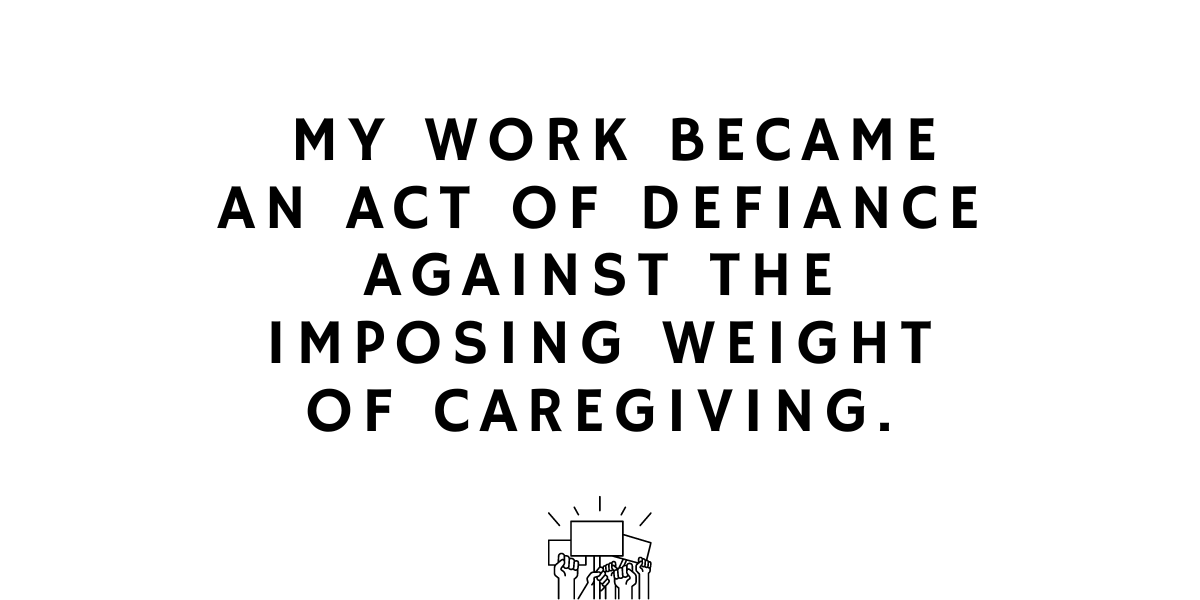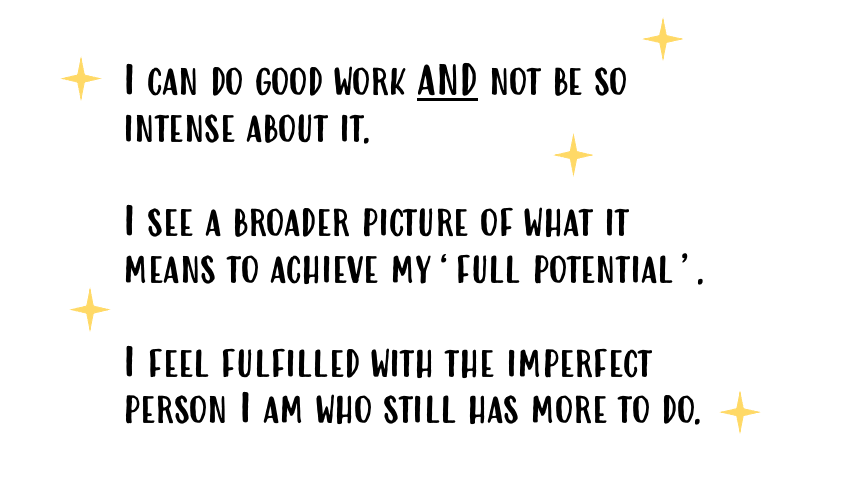From Overachiever to Peaceful Mindset
How I Shifted My Focus from Peak Performance once I became a parent
Well hello! It’s been a hot minute. I’m excited to be back and share my latest thoughts.
If you're new to Rule Breaker, welcome! This is where I challenge the conventional thinking and encourage a more human-first way in life and business.
Today, I’m challenging the notion that striving for peak performance is the only way to great at your job.
Seems like everywhere I turn there is advice on how to do more, be more, and achieve more. This is how I did the opposite. Here’s my journey from being an insatiable overachiever to finding a more peaceful and fulfilling mindset.
I hope it helps you discover something about yourself.
I have only known how to do my absolute most, even as a six year old
The idea of settling for something that is merely "good enough" has never been part of my DNA.
I remember in first grade, I was only satisfied with my report on bees when I attached a dead bee inside a sealed plastic baggie. The extra touch earned me top marks.
In university, I took a course that only required a pass (an average of 59/100 on all tests) to get the credit. But for the final exam, I didn't know the amount of effort needed to just pass, so I studied as if I was going for an A. I ended up acing the course, even though it didn't show up on my final transcript.
I have always pushed myself to achieve my full potential.
My overachieving nature became next level once I started working
Unlike in school where an A+ was the pinnacle of achievement, in the workplace, there was no limit to how much one could excel.
As an insecure overachiever, I very easily fell into the habits of someone striving for peak performance. I spent extra hours at night or on the weekends working. I set goals to achieve a promotion or a level of responsibility by a certain age. I consumed books, podcasts, and articles about self improvement. I networked a ton and took on extra projects that *might* lead to something in the future
This insatiable urge to fulfill my potential drove me relentlessly, pushing me to constantly strive for more.
Having kids has slowly changed how I think about doing my best
The change was subtle but five years into this mindset evolution, I can definitely say my overachiever self has mellowed.
At first, I would miss events because I was pregnant and needed to be horizontal by 7:30pm. Then weekends became no-work times. Then COVID daycare closures and another baby zapped my energy and time even further.
Looking back, there were five discrete stages to gaining a more peaceful mindset about what I can achieve in life.
My Five Stages to go from Overachiever to Peaceful Mindset
Stage 1. Denying I need to change
Initially, I tried to work as usual and let caregiving take over the non-work part of life.
I would work later at night once my daughter was asleep. I did emails while nursing. And, if I was really short on time, I could make it up on the weekend because missing a playdate didn’t matter to a baby.
It wasn’t the most relaxing schedule but with only one child and a partner who didn’t have as demanding professional responsibilities, I thought I could be both an involved mom and give my all to my professional goals.
Stage 2. Resisting becoming a statistic
Once my caregiving demands became less flexible and more time consuming, I resisted to better pace my professional pursuits
To find time for work, I pulled back on me-time. I stopped watching shows or reading for pleasure. I skipped out on time with my friends. I didn’t get to the gym. Not doing these things allowed me to do a writing course or take on an additional client.
My work became an act of defiance against the imposing weight of caregiving. I resisted becoming that person, often cited in gender diversity reports, whose salary and career plummet after having kids. I didn’t want to be a statistic.
Stage 3. Burn out
Well, my solo protest against the patriarchy ended in burnout.
Not surprisingly, the lack of self care caught up with me. Numerous times I found myself at my wits end feeling like I’ve never been so exhausted. Each time I hit my bottom I would pledge to take better care for myself. I would have a long sleep, do yoga a few days in a row, feel great and then fall back into the same unsustainable routine.
It took me a few cycles of resistance and burnout to realize that I needed a wholesale change in my actions and mindset.
Stage 4. Anger against the system
Once I realized that I couldn't sacrifice self-care and needed to cut back my time and energy I put into work, I became angry.
I would vent to anyone who would listen about how society prioritizes professional success over caregiving. I got so fired up, I wrote an op-ed on the empty efforts corporate take to achieve gender equality in the senior ranks.
At home, I found myself becoming resentful. I referred to myself as a "disgruntled housewife," and my mood would plummet when I spent too much time in non-stop caregiving mode. Things that used to bring me joy, like cooking and spending time with my daughters, began to feel like chains holding me back from my full potential.
My aggressive, future-oriented mindset paired with the feeling of being hard done by made for a less-than-pleasant stage.
Stage 4.5 Acquiesce
There was a transitory stage before I became positive about letting go of my intensity about work and allowing caregiving to take some of its place.
In this time, I think of it as reluctantly complying with my new role but not being perfectly content about it. I would throw my hands up in the air and shrug when asked what I do. I would belittle myself by saying “I’m just a simple house wife” in response to my partner showing gratitude for the work I would do for our family.
I wasn’t yet confident or fulfilled with this new pace and prioritization of my life.
Stage 5. Acceptance of where I am today
In my fifth year as a caregiver I finally “softened” into my role.
The anger, resistance, go-go-go mindset melted away. In its place, a new mindset has come to life. I’m more focused on the present and finding fulfillment in what I do today instead of only working for a future outcome. I’ve begun to hold off on making decisions before it is necessary which eases my intense goal setting and the relentless pressure to progress. I am able to better recognize when an "A+" is necessary and when a "passing grade" is enough, and how much work it takes to achieve each.
My biggest ‘ah ha’s are that I can do good work AND not be so intense about it. This has allowed me to open up room for my caregiving self and see a broader picture of what it means to achieve my ‘full potential’. I feel fulfilled with the imperfect person that I am and the knowledge that I have more I want to do.
So there you have it. It was hard to shift from putting my absolute best into my professional life so I could make room for myself and my family. And I’m so happy I did it.
Have you gone through something similar? Are you part way through your transition? I’d love to hear your story and know if this resonates.
My intention is to write more frequently. My Trello board has a LONG list of topics I want to explore, including the clashes of caregiving and work and building socially good companies.
If there are breaks in between, you’ll know why ;)
Keep well,
J
Thanks to my new writing intern, ChatGPT, as well as Dan and Glenn.
Ps. I’m prioritizing shipping over perfection, so this post may not convey all my thoughts perfectly. I’d love comments or questions to keep the discovery going.









“My work became an act of defiance against the imposing weight of caregiving” - yes!! I totally feel this. Thank you for sharing your journey. So relatable. Love you. ❤️❤️
Jess! From the day I met you, you have impressed me with your smarts and passion. I love this blog because I think soooo many people can/will relate (myself included - who adopted this approach 5 years ago - opting to not work Friday's any longer - and have since left the city for a little "farm"). More of us need to recognize we can do great work, make an impact, AND not burn ourselves out. thank you for sharing.